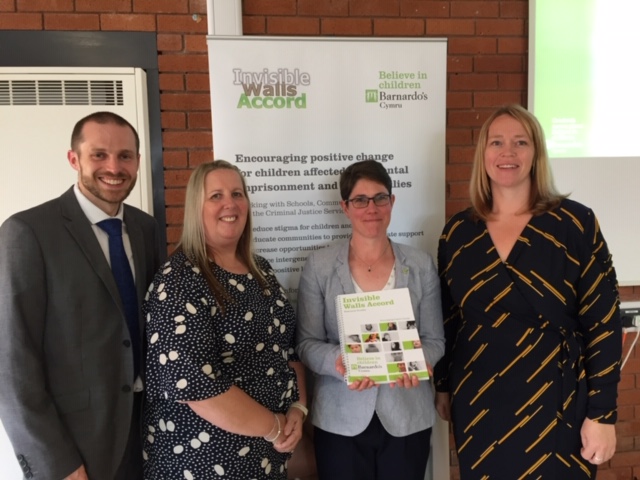
Children who are struggling with the trauma of having a parent in prison are receiving extra help thanks to a project being run by Barnardo’s Cymru.
Teachers across South Wales are being trained to identify and support such children while their classmates are learning why they should be kind and understanding.
Children of prisoners can suffer bullying, stigma and mental health issues but a new training pack produced by Barnardo’s Cymru is aimed at making life easier for them.
The toolkit offers teachers advice on how to spot children in their classes who might be affected and provides practical ways of helping them, whether it’s allowing them to share their feelings, helping them prepare for a prison visit or keeping their parent up to date with their school progress.
The pack also provides lesson plans to help whole schools become more aware of what it is like to have a relative in prison and to encourage children to be kind to classmates who do.
The toolkit, which is free and available in English and Welsh, is part of the Invisible Walls Accord, a project funded by the National Lottery Community Fund. It has seen Barnardo’s Cymru working in schools in Bridgend, Rhondda Cynon Taf, Cardiff and Vale, Neath Port Talbot, Swansea and Merthyr.
Barnardo’s also provides free training for teachers and runs classroom sessions to raise awareness among all pupils while giving children of prisoners the confidence to ask for help.
More than 5,000 children have benefited from the sessions so far with teachers reporting that pupils become much more supportive of each other. The sessions have been run by Barnardo’s staff and a team of trained volunteers.
Barnardo’s hopes many more schools will take up the training on offer before the project ends in December so that teachers will be well equipped to use the toolkit on their own in future.
The children’s charity has worked in partnership with G4S which runs HMP Parc and the Youth Offenders’ Institution, Bridgend where 2,000 children a week visit family members.
Seven per cent of children will see a parent imprisoned during their school years and those children are six times more likely to go on to offend themselves.
Sarah Crawley, Director of Barnardo’s Cymru, said: “These are very vulnerable children. They serve their own hidden sentence by suffering from the stigma of having a parent in prison. They can be bullied and experience a wide range of emotions from feelings of abandonment and anxiety to anger and distrust.
“It is such a traumatic time. Their family life is disrupted, household income can be reduced and their schooling can be seriously affected.
“We hope this toolkit will raise awareness among both teachers and classmates of what it is like for these young people. We spent three years working with children, families and teachers before producing this pack and we hope it will make a real difference for children in the future.”
Ysgol Bryn Castell, a special school in Brynmenyn, Bridgend, for pupils with autism and a wide range of social, emotional and behavioural difficulties, is one of the schools that has been working closely with Barnardo’s on the project.
Headteacher Helen Ridout said: “I believe every school in Wales should have the training as we should never lose sight of the impact a parent’s imprisonment has on a child. I visited HMP Parc and it really challenged me personally and made me consider things from a child’s perspective.
“For a child it is must be so frightening to see a parent disappear overnight, to be worried about the stigma, to see their whole lives turned upside down.
“Stacy Huston, our Barnardo’s project worker became part of our staff and was recognized by the pupils who were able to disclose to her things they might otherwise have kept to themselves. The impact on the school has been fantastic.”
Dave Allen of G4S said that maintaining family links had a significant impact on reducing reoffending and HMP Parc was committed to family interventions including running parent teacher evenings inside the prison, homework clubs where men could get involved in their children’s schoolwork and a scout group for children of long-term prisoners.


